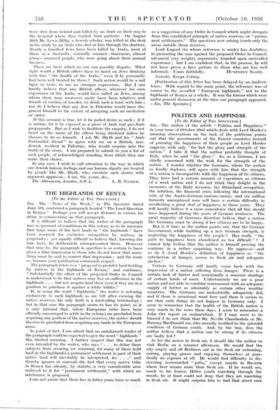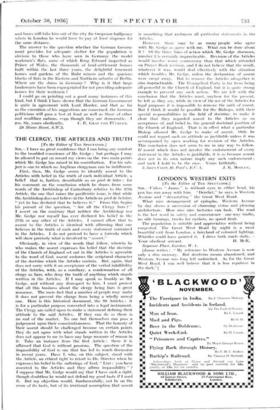POLITICS AND HAPPINESS [To the Editor of TILE SpEcTATon.1 SIR, — The
author of the article " Politics and Happiness " in your issue of October 23rd which deals with Lord Horder's amusing observations on the task of the politician points out that the governments of the Fascist countries, instead of pursuing the happiness of their people as Lord Horder suggests, wish only "for but the glory and strength of the nation." I take it that the author probably thought of Italy, when he said " the glory." So, as a German, I am chiefly concerned with the wish for the strength of the nation. I wonder whether the Germans, whom the author so kindly deplores, will agree with him that the strength of a nation is incompatible with the happiness of its citizens. They have had a certain amount of experience as citizens of a weak nation and I do not think they delight in the memories of the Ruhr invasion, the Rhineland occupation, the inflation, the financial crisis following the international veto of the Austro-German customs union; and six million formerly unemployed men will have a certain difficulty in recollecting a great deal of happiness in those years. They
will hardly believe it a mere coincidence that all this should have happened during the years of German weakness. The great majority of Germans therefore believe that a nation like Germany must be strong if her citizens are to be happy.
But is it true, as the author points out, that the German• Government, while building up a new German strength, is neglecting the happiness of the people ? Has really " the path to happiness been abandoned as too difficult " ? I cannot help feeling that the author is himself proving the contrary in a rather surprising way. He approves—and so do I—Lord Horder's definition of happiness as " the satisfaction of hunger, access to fresh air and adequate shelter."
Visitors to Germany will hardly come back with the impression of a -nation suffering from hunger. There is a certain lack of butter and occasionally a seasonal shortage of certain kinds of meat. Unfortunately we are a poor nation and not able to combine rearmament with an adequate' supply of butter as admirably as certain other wealthy countries. The Germans are undoubtedly adequately fed, and if there is occasional want here and there it occurs to me that such things do not happen in Germany only. I seem to remember that the health of the British nation is very much in the news these days, I seem to remember. a John Orr report on malnutrition. If I may seem to be biassed I do not think that Mr. Neville Chamberlain or Mr. Ramsay MacDonald are, who recently testified to the splendid condition of German youth. And, by the way, does the author believe that a nation can be strong if its citizens are badly fed As for the access to fresh air, I should like the author to visit Berlin on a summer afternoon. He would find the city empty and all Berliners out in the fresh air swimming, rowing, playing games and enjoying themselves at prac- tically no expense at all. He would find difficulty in dis- covering overcrowded " pubs," except maybe in Bavaria where beer means more than fresh air. If he would see, much to his horror, Hitler youth marching through the woods, he at least could not deny that they are marching in fresh air. It might surprise him to find that street cars and buses will take him out of the city for twopence-halfpenny where in London he would have to pay at least sixpence for the same distance.
The answer to the question whether the German Govern- ment provides for adequate shelter for the population is obvious to those who have seen in Germany the model workmen's fiats, some of which King Edward inspected as Prince of Wales, the thousands of land-settlement houses built within the last three years, the delightful tenement homes and gardens of the Ruhr miners and the spacious blocks of flats in the Eastern and Northern suburbs of Berlin. Where are the slums in Germany ? Why is it that large landowners have been expropriated for not providing adequate homes for their workmen ?
I could go on pointing out a good many instances of this kind, but I think I have shown that the German Government is quite in agreement with Lord Horder, and that as far as the execution of his suggestions are concerned, the German politicians wilt pass a test at least as well as those of other and wealthier nations, even though they are democratic.—I





















































 Previous page
Previous page